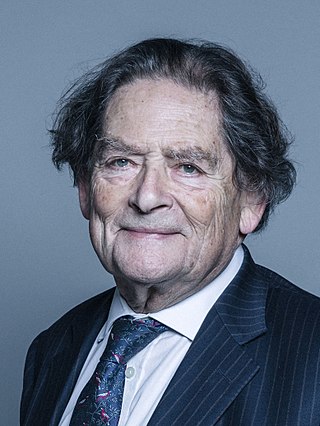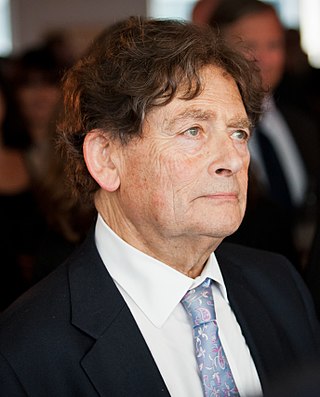
Nigel Lawson, Baron Lawson of Blaby, was a British politician and journalist. A member of the Conservative Party, he served as Member of Parliament for Blaby from 1974 to 1992, and served in Margaret Thatcher's Cabinet from 1981 to 1989. Prior to entering the Cabinet, he served as the Financial Secretary to the Treasury from May 1979 until his promotion to Secretary of State for Energy. He was appointed Chancellor of the Exchequer in June 1983 and served until his resignation in October 1989. In both Cabinet posts, Lawson was a key proponent of Thatcher's policies of privatisation of several key industries.

John Smith was a Scottish politician who was Leader of the Opposition and Leader of the Labour Party from July 1992 until his death in May 1994. He was also Member of Parliament (MP) for Monklands East.

Norman Stewart Hughson Lamont, Baron Lamont of Lerwick, is a British politician and former Conservative MP for Kingston-upon-Thames. He served as Chancellor of the Exchequer from 1990 until 1993. He was created a life peer in 1998. Lamont was a supporter of the Eurosceptic organisation Leave Means Leave.

Richard Edward Geoffrey Howe, Baron Howe of Aberavon,, known from 1970 to 1992 as Sir Geoffrey Howe, was a British politician who served as Deputy Prime Minister of the United Kingdom from 1989 to 1990. A member of the Conservative Party, he was Margaret Thatcher's longest-serving Cabinet minister, successively holding the posts of chancellor of the Exchequer, foreign secretary, and finally leader of the House of Commons, deputy prime minister and lord president of the Council. His resignation on 1 November 1990 is widely considered to have precipitated the leadership challenge that led to Thatcher's resignation three weeks later.
A tax cut typically represents a decrease in the amount of money taken from taxpayers to go towards government revenue. This decreases the revenue of the government and increases the disposable income of taxpayers. Tax rate cuts usually refer to reductions in the percentage of tax paid on income, goods and services. As they leave consumers with more disposable income, tax cuts are an example of an expansionary fiscal policy. Tax cuts also include reduction in tax in other ways, such as tax credit, deductions and loopholes.
A personal equity plan (PEP) was a form of tax-privileged investment account in the United Kingdom, available between 1986 and 1999.

In the United Kingdom, taxation may involve payments to at least three different levels of government: central government, devolved governments and local government. Central government revenues come primarily from income tax, National Insurance contributions, value added tax, corporation tax and fuel duty. Local government revenues come primarily from grants from central government funds, business rates in England, Council Tax and increasingly from fees and charges such as those for on-street parking. In the fiscal year 2023–24, total government revenue was forecast to be £1,139.1 billion, or 40.9 per cent of GDP, with income taxes and National Insurance contributions standing at around £470 billion.
In the UK tax system, personal allowance is the threshold above which income tax is levied on an individual's income. A person who receives less than their own personal allowance in taxable income in a given tax year does not pay income tax; otherwise, tax must be paid according to how much is earned above this level. Certain residents are entitled to a larger personal allowance than others. Such groups include: the over-65s, blind people, and married couples where at least one person in the marriage was born before 6 April 1935. People earning over £100,000 a year have a smaller personal allowance. For every £2 earned above £100,000, £1 of the personal allowance is lost; meaning that incomes high enough will not have a personal allowance.

The Lawson Boom was the macroeconomic conditions prevailing in the United Kingdom at the end of the 1980s, which became associated with the policies of Margaret Thatcher's Chancellor of the Exchequer, Nigel Lawson.

The 2011 United Kingdom budget, officially called 2011 Budget – A strong and stable economy, growth and fairness, was delivered by George Osborne, the Chancellor of the Exchequer, to the House of Commons on 23 March 2011.

The June 1979 United Kingdom budget was delivered by Geoffrey Howe, the Chancellor of the Exchequer, to the House of Commons on 12 June 1979. It was Howe's first budget and the first of the first Thatcher ministry, which had been elected a few weeks earlier. It was also the second budget to be delivered to Parliament in 1979. The budget marked a major change in direction for the UK economy, with an increase in reliance on interest rates and monetary policy to control inflation. It is also noted for its introduction of substantial tax cuts, such as reducing the top rate of income tax from 83% to 60% and the basic rate from 33% to 30%. The budget also saw an increase in VAT from 8% to 15%.

The 1990 United Kingdom budget was delivered by John Major, the Chancellor of the Exchequer, to the House of Commons on 20 March 1990. It was the only budget to be delivered by Major during his tenure as Chancellor, and the twelfth and final budget to be presented by the Conservative government of Margaret Thatcher, who would resign as prime minister later that year. The 1990 budget also marked the first occasion on which a budget statement was televised, after cameras were allowed into the House of Commons in November 1989.

The 1988 United Kingdom budget was delivered by Nigel Lawson, the Chancellor of the Exchequer, to the House of Commons on 15 March 1988. It was the fifth budget to be delivered by Lawson during his tenure as Chancellor, and marked major changes to taxation, with reductions in income tax and changes to inheritance tax rules, as well as changes to mortgage interest relief that prevented homebuyers from being able to pool mortgage allowances. The changes announced to mortgage relief ultimately helped to further fuel an ongoing property boom which led to a rise in inflation and an increase in interest rates. Due to frequent disruptions during the Chancellor's speech, Deputy Speaker Harold Walker was required to suspend proceedings in what was described as an outbreak of "grave disorder".

The 1989 United Kingdom budget was delivered by Nigel Lawson, the Chancellor of the Exchequer, to the House of Commons on 14 March 1989. It was the sixth and final budget to be presented by Lawson during his tenure as Chancellor, and took a much more cautious approach to the UK economy than previous budgets delivered by Lawson. It was outlined against the back drop of mounting economic turbulence with increasing interest rates and rising inflation. 1989 was also the final pre-television era budget to be presented to the House of Commons.

The 1992 United Kingdom budget was delivered by Norman Lamont, the Chancellor of the Exchequer, to the House of Commons on 10 March 1992. It was the second budget to be presented by Lamont. It was also the last before the 1992 general election, which was called the following day, and shaped the Conservative Party's election campaign for that year.

The 1987 United Kingdom budget was delivered by Nigel Lawson, the Chancellor of the Exchequer, to the House of Commons on 17 March 1987. It was the fourth budget to be presented by Lawson, and saw him announce tax cuts worth £2.6bn. He also forecast a £3bn reduction in government borrowing. Among his announcements were a reduction in the basic rate of income tax from 29% to 27%, and a reduction in Corporation Tax from 29% to 27%. The budget took place three months before the 1987 general election, which the Conservatives won. Neil Kinnock, leader of the Opposition Labour Party described it as a "bribes budget".

The 1985 United Kingdom budget was delivered by Nigel Lawson, the Chancellor of the Exchequer, to the House of Commons on 19 March 1985. The second budget to be presented by Lawson, it was held shortly after the end of the year-long 1984–85 miners' strike. The chancellor said the cost of the strike on public borrowing had impacted on his plans for tax reductions, although he did make some changes to income tax personal allowances and stamp duty. Changes to National Insurance were also announced, but threatened to place extra costs on employers.

The 1984 United Kingdom budget was delivered by Nigel Lawson, the Chancellor of the Exchequer, to the House of Commons on 13 March 1984. It was the first budget to be presented by Lawson, who had been appointed as chancellor after the 1983 general election, and saw him embark on "a radical programme of tax reform". These included a reduction in Corporation Tax and a cut in the higher rate of Transfer Tax and raised the Stamp Duty threshold.

The 1983 United Kingdom budget was delivered by Geoffrey Howe, the Chancellor of the Exchequer, to the House of Commons on 15 March 1983. It was the final budget to be presented before the 1983 general election and the last to be presented by Howe. He announced a programme of tax cuts worth around £2bn for individuals and £750m for business, as well as increasing personal allowances by 14%, 8.5% above the rate of inflation. Social Security benefits were also raised. The Conservatives went on to win the election, but Howe would subsequently be replaced as chancellor by Nigel Lawson in a post-election cabinet reshuffle.

The 1978 United Kingdom budget was delivered by Denis Healey, the Chancellor of the Exchequer, to the House of Commons on 11 April 1978. It was the sixth and penultimate budget to be presented by Healey, and the first to be broadcast on the radio. It saw the chancellor unveil a programme of tax cuts worth £2.4bn, including reductions in Corporation Tax for small businesses, and Capital gains tax. A new temporary lower rate of income tax was also introduced, which would be abolished by Geoffrey Howe in the 1980 budget, while the basic rate of income tax was cut by 1%. Healey also reintroduced free school milk for children aged 7 to 11. He told the House that for once he was not asking people to make any sacrifices. Labour MPs gave the statement a lukewarm reception, while the Liberal Party, which had recently been in an alliance with the government following the Lib–Lab pact, were more enthusiastic. In her response, the Conservative leader, Margaret Thatcher, the then Leader of the Opposition, claimed the tax cuts would soon disappear.








